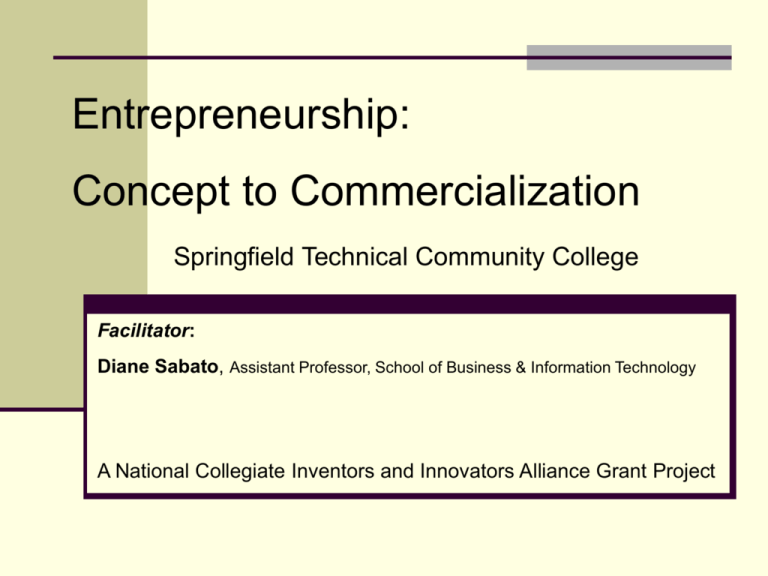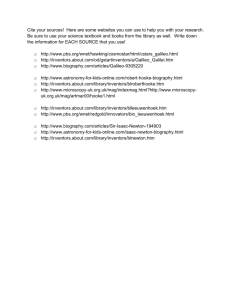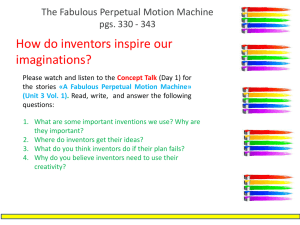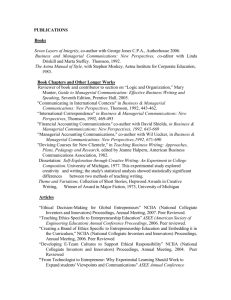Diane Sabato - National Association for Community College
advertisement

Entrepreneurship: Concept to Commercialization Springfield Technical Community College Facilitator: Diane Sabato, Assistant Professor, School of Business & Information Technology A National Collegiate Inventors and Innovators Alliance Grant Project About the Class… This honors course promotes, enhances and supports innovation through the use of guest speakers, workshops, lectures, field trips, laboratory experiments, professional advice and group dynamics. Student teams from a variety of disciplines work on projects, centered on real-life designs and ideas, with emphasis on creativity and ingenuity, culminating in a marketable innovation. Areas of special interest are; safety, adaptive (universal) design, comprehensive application, flexibility and environmental impact. How the class was developed One year planning grant from the National Collegiate Inventors and Innovators Alliance Meetings with Vice Presidents and Deans to gather input to build course content and promote across campus How the course was funded National Collegiate Inventors and Innovators Alliance, Lemelson Funds STCC in-kind contributions of staff support, facility and lots of pizza in the early years, through collaboration with the Entrepreneurial Institute How did we implement it? Run as pilot for first two semesters, free to students, supported by grant File course request through the Honors Department to formalize the course offering Curriculum committee course approval as Honors Program Humanities elective, three credit class Guest Speakers: Key to Success: Paul Thornton, Author, “Leadership” Michael Garjian, Innovators Resource Network, “Inventors Journaling, Invention to Business Startup” John Reynolds, Beyond Brackets, Inventor, “Idea to Patent” Wes Downey and Glen Carlson, Inventors, Defiant Wheels, “Working your invention business” Tommy Goodrow, Vice President, Economic and Business Development, “Making It Happen!” James Page, Page Product Design, “Prototyping” Dennis Kunkler, Designed to Sell, Author, “Product Positioning” Gayle Hsiao, Entrepreneurship Educator, “Idea Building” Arlene Rodriguez, Faculty, “STCC Honors Program” Diane Doherty, Mass Small Business Development Center Network Director, “Business Plans” Kris Kozuch, “Adaptive Technology and Universal Design” Carol Farley, Office Information Technology Faculty, “Creating PowerPoint Presentations” Tori Pleasant, Business Consultant, “Personal presentation skills.” Gary Bogoff, Owner, Berkshire Brewing Co., “Owning and running your own business.” The Inventions: “Discovery consists of seeing what everybody has seen and thinking what nobody else has thought.” - Albert von Szent-Gyorgyi, Hungarian Biochemist Some of the Inventions… The Beverage Keeper prototypes Motor Mouth – tracks engine run time Sandy Q Disposable tools for fine woodworking (made with recycled road sand) Glasses with built-in repair kit L.L. Knights- for nighttime activities Multiple Prototypes It’s a rapid load paintball gun Children’s clothing innovation Three ideas in one group Ideas and More Ideas Hot or Cold Lunch Keeper Multi-head Hammer Convertible shoes Some of the Process Including CAD and Rapid Protoyping! The Inventors and Facilitators Entrepreneurship: Concept to Commercialization Section I - Innovation and Opportunity Program Description and Purpose. Assembling a Comprehensive Team, Choosing Roles and Responsibilities. Seeking & Recognizing Opportunities. Brainstorming, Development and Pursuit of Project Item. Section II – Team and Concept Viability Set Individual E-Team Objectives. E-Team Project Development. Creative Problem Solving Skills for Entrepreneurs. Evaluating and Certifying Viability. Entrepreneurship: Concept to Commercialization Section III – Marketing, Management and Legal Considerations Intro to Small Business Management. Small Business Marketing Seminar. Researching the Market for Your Idea. Developing Marketing Skills for Your Idea. Research Skills for Patents and Copyrights. Legal Environments for Business. Section IV – Business Plan Development Academic Problem Solving Skills in Academics. Business Plan Development of Objectives. Developing Business Plan Timelines & Strategies. Project Safety Considerations. Project Design Considerations. Create the Project Business Plan. What worked… Guest speakers Creativity exercises Hands on activities Diverse group interaction Group meeting outside of class time Students setting timelines Challenges… Grading – created new criteria Attendance Diverse group interaction Group work outside of class Idea generation early in the process Building multiple prototypes What’s next? Regenerative feedback, continuous course improvement Ongoing marketing and promotion New class, open to all students Entry level innovation class: “Exploring Innovation for the 21st Century” Exploring Innovation for the 21st Century This course provides direct theoretical and practical expertise in innovation and design. It will utilize the E Team concept (Entrepreneurship Team) to promote, enhance and support innovation through the use of field studies, group dynamics, design, prototyping, professional advice and guest speakers. Students will be recruited from a variety of disciplines to enhance the E-Team composition and dynamics. Exploring Innovation for the 21st Century Student projects will focus on redesign of real-life existing products. The class will explore the relationship between Art and Engineering. Emphasis is given to the students’ creativity and ingenuity, culminating in a marketable innovation. Areas of special interest are; comprehensive application, flexibility, environmental impact, adaptive and universal design and safety. Exploring Innovation for the 21st Century Course Objectives: Through reading, lectures, lab projects and problem solving, students will be able to: 1. Analyze a device or product and redesign it based on the latest materials and technologies available. 2. Work effectively in teams to explore product/project viability and set individual objectives. 3. Be able to storyboard and evaluate ideas and concepts for prototypes. 4. Develop a final design, fabricate prototypes and demonstrate their use. 5. Communicate effectively through discussions and written documents. 6. Finalize the product and present it to a group. The Deep Dive Click here: http://www.youtube.com/watch?v=THz6kbcg w9E&feature=related The Tower of Babel Challenge “…conflict is the primary engine of creativity and innovation. People don’t learn by staring into a mirror, people learn by encountering difference.” ~ Ronald Heifetz Director of Leadership Education Project, Harvard University The journey has been incredible. Contact Information: Springfield Technical Community College One Armory Square, Ste. 1 P.O. Box 9000 Springfield, MA 01102-9000 Diane Sabato, Assistant Professor, School of Business dsabato@stcc.edu 413.755.4836






